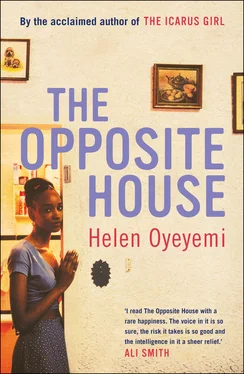Helen Oyeyemi - The Opposite House
Здесь есть возможность читать онлайн «Helen Oyeyemi - The Opposite House» весь текст электронной книги совершенно бесплатно (целиком полную версию без сокращений). В некоторых случаях можно слушать аудио, скачать через торрент в формате fb2 и присутствует краткое содержание. Год выпуска: 2008, Издательство: Bloomsbury UK, Жанр: Современная проза, на английском языке. Описание произведения, (предисловие) а так же отзывы посетителей доступны на портале библиотеки ЛибКат.
- Название:The Opposite House
- Автор:
- Издательство:Bloomsbury UK
- Жанр:
- Год:2008
- ISBN:нет данных
- Рейтинг книги:4 / 5. Голосов: 1
-
Избранное:Добавить в избранное
- Отзывы:
-
Ваша оценка:
- 80
- 1
- 2
- 3
- 4
- 5
The Opposite House: краткое содержание, описание и аннотация
Предлагаем к чтению аннотацию, описание, краткое содержание или предисловие (зависит от того, что написал сам автор книги «The Opposite House»). Если вы не нашли необходимую информацию о книге — напишите в комментариях, мы постараемся отыскать её.
The Opposite House — читать онлайн бесплатно полную книгу (весь текст) целиком
Ниже представлен текст книги, разбитый по страницам. Система сохранения места последней прочитанной страницы, позволяет с удобством читать онлайн бесплатно книгу «The Opposite House», без необходимости каждый раз заново искать на чём Вы остановились. Поставьте закладку, и сможете в любой момент перейти на страницу, на которой закончили чтение.
Интервал:
Закладка:
My grandmother, Abuela Laline, didn’t understand or trust Brigitte’s knife-edge stability. But Chabella did. Of Brigitte, Chabella has said, ‘People like Brigitte are made for guarding the world from harm. They stay in a room with whatever is bad and they hold the door closed from the inside.’
Laline spoke stiffly to Brigitte, always formal. Laline had to tolerate Brigitte because Brigitte was her husband’s guest. I suggested that maybe Abuela Laline didn’t like Brigitte because she thought that Abuelo Damason was carrying on another affair right under her nose. Chabella shook her head. She said, ‘No, everyone could see it wasn’t like that with them. Brigitte was. . I mean, the way she looked at my Papi, the way she spoke to him, it was man to man. Yes, she was clever, but my Mami was very clever too, and yet when she met eyes with my Papi her cleverness didn’t stop her will from sort of stepping back. So I don’t know what it was with Brigitte. When I say “man to man” I don’t mean that Papi and Brigitte sat up smoking and drinking together or anything. Because she was. . I mean, you never saw her without lipstick, you never smelt her, you only smelt perfume. She re-dyed her hair as soon as a little darkness came through at the roots. When she arrived, she couldn’t even lift her own suitcase out of Papi’s car; I had to do it because your aunts and your abuela had gone into hiding upstairs so that they could watch Brigitte from the windows. But my Papi kept saying to her, “When you came towards me at the train station, more than anything else I wondered whether I would be able to beat you in a fight.” ’
Brigitte didn’t laugh or seem annoyed when Chabella kept asking her her age; she just calmly gave my Mami variations on the theme of: ‘As you can see, I’m much older than you, nicht wahr?’
To fifteen-year-old Mami, Brigitte maintained — in ‘take it or leave it’ tones — that she had been shot by a jealous boyfriend while at university.
‘I don’t want you to make any generalisations about German men,’ she said, ‘but every single German man that I have been involved with has been too. . obvious. This boyfriend, I knew he was a very jealous man, and I knew that he thought you have rights to something as long as you want it more than anyone else. On top of all this he believed that the largest acts speak in a new and transcendent tongue. And so yes, very boringly, when I wanted to leave him he did try something — a large and wilful act.’
Chabella rebuked her: ‘Ay Brigitte, he shot you, you know! How can you say “boringly”?’
Abuelo Damason brought Brigitte home because he was good friends with someone in Santa Clara who cared about her. The someone was a man who knew she needed to get across into America before he could breathe out and believe that all was well with her. But Brigitte needed some time before she would try to leave from Jose Marti airport; she shared Chabella’s bedroom for five months. Brigitte swished around in tweed skirts with flipped hems, nylons with black diamond seams and open-toed pumps, and she let Chabella use her make-up without asking. Without saying a word, Brigitte managed to convince Chabella and her Papi that Chabella should have stopped wearing knee socks and strapped shoes at thirteen. Brigitte needed it to be completely dark when she slept. She didn’t like to wake up all at once, so she wore a black eye-mask at night and had grown expert at finding her way around without taking it off. Chabella grew used to seeing her flitting about the house with only the light pressure of her right hand on the wall to show her uncertainty.
Brigitte called Chabella moquenquen , made her the universal child just as their housemaid Maria did. Moquenquen said in Brigitte’s accent sounded cold at first, almost sarcastic. When Chabella tied on her white headscarf to go to Santeria Mass, Brigitte didn’t ask her where she was going but said, ‘Please, say a prayer for me. I, too, like to fight on every level. I am also the type to throw coins into wishing wells.’
Brigitte and Chabella would lie wounded by the heat on their bedroom floor some noontimes listening to Elvis Presley, then to The Platters with the volume turned low. Brigitte’s understanding of English was far better than Chabella’s, but She still refused to divulge which of the songs told the truth about love. She gave Chabella copies of Das Kapital and The Communist Manifesto . Chabella still has the books; they are in German and were cherished, but not by Chabella. The books’ pages sprout hair-like shreds, rubbed bald by a finger running underneath each line again and again.
Brigitte said of the books, ‘Isabella, such thoughts! But. . what had been made of them. . ah. Zerrissen . I am. . estoy en el conflicto.’
Often in her first month at my Abuelo Damason’s house, when Brigitte couldn’t find the Spanish for what she was thinking, she would fall to repeating the German word instead and very seriously miming its meaning with her long, smooth arms, which she shaved so that the dark hairs wouldn’t show. Mami squeaked ‘What, what?’ and made desperate guesses. But the more Brigitte mimed, the less Chabella understood, and they made their own comedies. Brigitte would constantly try to reach for those words most difficult for a foreigner to remember.
Brigitte was afraid that every place in the world was the site of a murder. She was afraid of Fidel because, above all, he asked for the people’s affection, and she didn’t see how justice could live alongside affection. She tried to describe a regime of love: lovers get jealous; they are petty and impetuous; they give you stupid gifts that you cannot use. When things become desperate, lovers may stalk you, and ultimately, if they saw a way to, they would tap your phone. So, love into hate.
Brigitte refused to show Chabella the bullet wound she’d been given by her jealous boyfriend. Instead she narrowed her eyes, hovered a finger above the soft bend of Chabella’s elbow and said, ‘There.’ She stabbed the air just above the spot and clicked her tongue against the roof of her mouth. The pain of it crashed through all Chabella’s joints.
Brigitte was a Republiksflüchtling . She came to Chabella and Habana at the same time as there came a feeling of imminent change, a sense that the world had set an alarm and the trees and buildings and sky would tell the time before the people could. Nobody could give a date, but people gossiped and did not trust the stoic face of Habana, the mud-glued potholes and dull, scrolled balconies. Things would change completely — but when?
Chabella supposed that roof tiling would slip westwards like birds chasing warm weather, the clouds would let down a white drinking straw and someone above would suck up all the harbour water like it was ron . The trees would shake down a new kind of water, leaves as liquid sacrifice.
Brigitte’s escape circumstances were privileged, but for Chabella and my grandparents, Brigitte was evidence of a hushed statistic of the time. She presented herself to the Montoyas as one of those East German citizens — one in every six — who managed to flee the country before the Wall went up. Brigitte was both lucky and clever; her parents had been long-time members of the Communist Party and had kept on believing even when Hitler and National Socialism had put them in danger. But when Germany was divided between the power blocs, police and Soviet tanks crushed the grass roots, the workers who demonstrated and raided food factories because they had already given of themselves according to their ability but were still hungry.
Brigitte heard about it on the radio, but she had already known it in her head and the knowledge translated into a great silence inside. In her views she was careful to toe the party line, and she took her well-chosen degree in political philosophy with its emphasis on Marxism. And she used that degree to disappear with permission. Brigitte took Spanish classes and bent her thoughts on Cuba, since Cuba was close to America and America was not Communist or Fascist or anything too strongly other than rich.
Читать дальшеИнтервал:
Закладка:
Похожие книги на «The Opposite House»
Представляем Вашему вниманию похожие книги на «The Opposite House» списком для выбора. Мы отобрали схожую по названию и смыслу литературу в надежде предоставить читателям больше вариантов отыскать новые, интересные, ещё непрочитанные произведения.
Обсуждение, отзывы о книге «The Opposite House» и просто собственные мнения читателей. Оставьте ваши комментарии, напишите, что Вы думаете о произведении, его смысле или главных героях. Укажите что конкретно понравилось, а что нет, и почему Вы так считаете.












